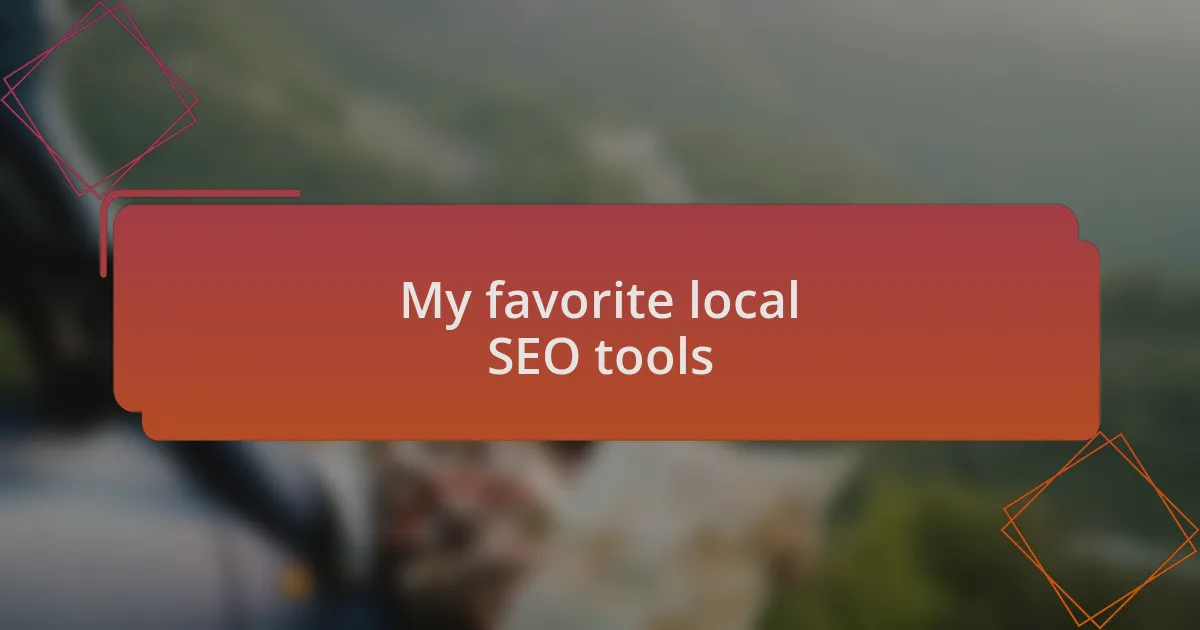Key takeaways:
- Local search engines deliver geographically relevant results, enhancing user experience and connecting them with nearby businesses.
- Local SEO improves business visibility and builds community trust, as consumers often choose businesses based on local search prominence.
- Key local SEO tools include Google My Business, Moz Local, and BrightLocal, which help manage listings, track rankings, and enhance marketing strategies.
- Best practices for local SEO involve ensuring consistent business information, encouraging customer reviews for social proof, and utilizing local keywords to increase visibility.

What is local search engine
A local search engine focuses on delivering search results that are geographically relevant to users. When I think about my own experiences searching for nearby services or businesses, I realize how impactful these results can be. It’s like having a helpful friend point me toward the best coffee shop just around the corner.
These local search engines utilize data like location, users’ search behavior, and local listings to provide tailored results. I’ve found that when I search for “restaurants near me,” I usually get a list of places I never even knew existed. It’s fascinating how algorithms can connect us to hidden gems based on simple queries.
Many people might wonder why local searches matter in the digital age. Personally, I’ve often chosen businesses solely based on their visibility in local search results. This shows me that local SEO is not just a technical term; it directly influences our daily choices and interactions in our communities. It amplifies the importance of supporting local businesses, fostering a sense of connection in our neighborhoods.

Importance of local SEO
When I think about the significance of local SEO, one thing stands out: it directs eager customers right to your doorstep. I’ve felt the difference firsthand when searching for pet services. The listings that popped up led me to a fantastic groomer just a mile away, and without local optimization, I might have missed out on that perfect match. Isn’t it intriguing how local SEO can bridge the gap between businesses and their ideal clientele?
Moreover, local SEO isn’t just about visibility; it builds trust within communities. I remember when I was scrolling through reviews and came across a local diner with glowing testimonials. The fact that they appeared prominently in local search results gave me confidence to choose them over bigger chains. Wouldn’t you agree that seeing local businesses highlighted makes them feel more approachable and relatable?
Finally, the growing trend of mobile searches emphasizes local SEO’s relevance today. I often find myself looking for services on my phone while out and about. When I see businesses optimized for local search, it resonates with my desire for convenience. It’s almost like an unspoken connection, where the business understands just what I need, right when I need it. Local SEO isn’t just a tool; it’s a vital part of nurturing community relationships.

My favorite local SEO tools
When it comes to local SEO tools, I can’t help but appreciate the power of Google My Business. This platform has been invaluable for me. I remember updating my own business’s profile, refining the categories and adding photos that narrated our story. Seeing foot traffic increase after that felt like watching seeds sprout—it’s rewarding to know that the right tools can make such a difference.
Another favorite of mine is Moz Local. It simplifies the process of managing local listings, which can otherwise be quite overwhelming. I distinctly remember a time when I was working with a local restaurant owner who struggled with inconsistent information across platforms. After using Moz Local to audit and correct their listings, we saw an uptick in online reservations. Isn’t it fascinating how a small change in visibility can lead to tangible results?
Lastly, I have a soft spot for BrightLocal. The ability to track local search rankings and analyze competitors’ performance has been a game changer for me. I often find myself diving into their reports, uncovering insights that transform how I approach my local marketing strategies. Have you ever had that moment when you realize you’re on the right track, merely by understanding the local landscape better? It makes me feel more empowered to connect businesses with their communities, and that’s what local SEO is all about.

Best practices for local SEO
When optimizing for local SEO, ensuring consistency in your business information across all platforms is crucial. I recall a time when I helped a friend who owned a boutique, and we discovered her address was slightly different on Google and her website. It astounded me how this minor inconsistency could confuse customers and potentially lead them away. Keeping everything uniform not only builds trust but also helps search engines understand where you are.
Another best practice I highly recommend is encouraging customer reviews. I can tell you from experience that reviews don’t just boost your rankings; they also create an emotional connection with potential customers. Once, I engaged with a local auto repair shop that had a steady stream of praise from satisfied clients. Each review painted a picture of their reliability and commitment, making it easy for new customers to choose them over others. Have you ever decided to try a restaurant just because of glowing reviews? That’s the power of social proof at work.
Lastly, utilizing local keywords can significantly enhance your visibility. There was this moment when I was optimizing a small café’s website, and we brainstormed to find keywords that truly resonated with the neighborhood vibe. Incorporating terms that reflected community events and landmarks not only improved their rankings but also made their content feel authentic and relatable. How often do you search for something local and find that perfect keyword draws you in? It shows that relevance is key, especially when catering to a specific audience.